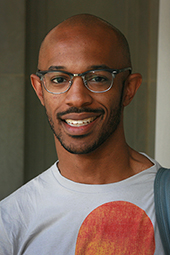
Even while working as a doctoral student at the School of Education, William Jackson is making a difference in the lives of Durham children and their families.
Jackson, who is pursuing his Ph.D. in educational psychology, measurement and evaluation, is running a nonprofit organization called Village of Wisdom that works with black families in Durham to help children develop self-confidence and positive identities to help them achieve in school.
Jackson’s work is profiled in an article by Education Pioneers entitled “Why Every Education Leader in American Needs to Talk to William Jackson.” Jackson is an alumnus of Education Pioneers, a nonprofit group the works to develop educational leaders.
In the article, Jackson describes his work in which he seeks to address black children’s need to develop strong identities to help them succeed in a world where they are having to navigate between the culture of their home, family life and neighborhood life and that of school.
Without a solid identity, he points out, it’s hard for any child to focus. Being hyperaware of how you’re “supposed” to behave at school, for instance, is undoubtedly draining for kids. For Black students, having a strong identity is especially critical to cope with the cultural devaluation they often experience in schools.
“We’re asking Black kids to code switch because their cultural practices don’t reflect white ones,” William says. “The message kids frequently get from school is that they need to code switch because their own culture has little value.”
The solution isn’t getting rid of different contexts, William points out, as the ability to move easily between cultures and contexts is incredibly valuable in today’s global society. But where we have more work to do in schools is realizing where, why, and how we expect Black students to code switch to reflect white culture.
There’s an important opportunity here that William notes: “How can we create school environments where more than one cultural context is frequently used?”
William wants kids to have pride in who they are and in their home culture. A strong positive self-identify gives them the emotional support they need to navigate school environments and equips them with the skills they need to thrive in our global society.
Village of Wisdom holds community events and works with community groups to hold sessions with families to launch conversations about maintaining positive black identities.
“If we are to achieve real equity for all children—and especially for children of color and children from poor families who have been systematically left behind—we must talk about race and systemic racism. But leading that work comes with the responsibility of truly understanding it and why it’s critical, no matter the color of our skin.
“Why is it that people feel so capable of handling diversity when they’ve had no training, don’t know measures behind it, or know the impact of racism on all people of color?” William says. “If you’re going to launch a diversity initiative, without even one person of color who has that knowledge, aren’t you doing that work irresponsibly? That’s relevant to white people, Black people, and people of color. All of us who want to do work in communities of color, if you haven’t done the work to investigate why things are as they are, why should you be in power?”